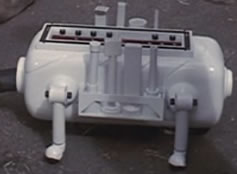Science Fiction
Dictionary
A B C D E F G H I J K L M N O P Q R S T U V W X Y Z
Scent-Identifying Robot Uses Machine Learning

Researchers have connected the biological sensor to an electronic system and have used a machine learning algorithm; the resulting robot was able to identify odors with a level of sensitivity 10,000 times higher than that of a commonly used electronic device.
The researchers believe that in light of the success of their research, this technology may also be used in the future to identify explosives, drugs, diseases, and more.
“We connected the biological sensor and let it smell different odors while we measured the electrical activity that each odor induced. The system allowed us to detect each odor at the level of the insect’s primary sensory organ. Then, in the second step, we used machine learning to create a ‘library’ of smells.“In the study, we were able to characterize 8 odors, such as geranium, lemon and marzipan, in a way that allowed us to know when the smell of lemon or marzipan was presented. In fact, after the experiment was over, we continued to identify additional different and unusual smells, such as various types of Scotch whiskey.
“A comparison with standard measuring devices showed that the sensitivity of the insect’s nose in our system is about 10,000 times higher than the devices that are in use today.”
(Via NeuroscienceNews.)
SF fans have already seen uses for a robot that uses a biological sensor. An electronic nose, or sniffer robot was featured in the 1985 movie Runaway, written and directed by Michael Crichton.

(Sniffer robot from the movie Runaway)
The mechanical hound from Ray Bradbury's 1953 novel Fahrenheit 451 was also able to detect scents by setting the "ticking combinations of the [hound's] olfactory system".
Scroll down for more stories in the same category. (Story submitted 2/21/2023)
Follow this kind of news @Technovelgy.| Email | RSS | Blog It | Stumble | del.icio.us | Digg | Reddit |
Would
you like to contribute a story tip?
It's easy:
Get the URL of the story, and the related sf author, and add
it here.
Comment/Join discussion ( 0 )
Related News Stories - (" Robotics ")
Atlas Robot Makes Uncomfortable Movements
'Not like me. A T-1000, advanced prototype. A mimetic poly-alloy. Liquid metal.' - James Cameron, 1991.
Humanoid Robots Tickle The Ivories
'The massive feet working the pedals, arms and hands flashing and glinting...' - Herbert Goldstone, 1953.
Golf Ball Test Robot Wears Them Out
"The robot solemnly hit a ball against the wall, picked it up and teed it, hit it again, over and again...' - Frederik Poh, 1954.
PaXini Supersensitive Robot Fingers
'My fingers are not that sensitive...' - Ray Cummings, 1931.
Technovelgy (that's tech-novel-gee!) is devoted to the creative science inventions and ideas of sf authors. Look for the Invention Category that interests you, the Glossary, the Invention Timeline, or see what's New.
Science Fiction
Timeline
1600-1899
1900-1939
1940's 1950's
1960's 1970's
1980's 1990's
2000's 2010's
Current News
The New Habitable Zones Include Asimov's Ribbon Worlds
'...there's a narrow belt where the climate is moderate.'
Can One Robot Do Many Tasks?
'... with the Master-operator all you have to do is push one! A remarkable achievement!'
Atlas Robot Makes Uncomfortable Movements
'Not like me. A T-1000, advanced prototype. A mimetic poly-alloy. Liquid metal.'
Boring Company Drills Asimov's Single Vehicle Tunnels
'It was riddled with holes that were the mouths of tunnels.'
Humanoid Robots Tickle The Ivories
'The massive feet working the pedals, arms and hands flashing and glinting...'
A Remarkable Coincidence
'There is a philosophical problem of some difficulty here...'
Cortex 1 - Today A Warehouse, Tomorrow A Calculator Planet
'There were cubic miles of it, and it glistened like a silvery Christmas tree...'
Perching Ambush Drones
'On the chest of drawers something was perched.'
Leader-Follower Autonomous Vehicle Technology
'Jason had been guiding the caravan of cars as usual...'
Golf Ball Test Robot Wears Them Out
"The robot solemnly hit a ball against the wall, picked it up and teed it, hit it again, over and again...'
Boring Company Vegas Loop Like Asimov Said
'There was a wall ahead... It was riddled with holes that were the mouths of tunnels.'
Rigid Metallic Clothing From Science Fiction To You
'...support the interior human structure against Jupiter’s pull.'
Is The Seattle Ultrasonics C-200 A Heinlein Vibroblade?
'It ain't a vibroblade. It's steel. Messy.'
Roborock Saros Z70 Is A Robot Vacuum With An Arm
'Anything larger than a BB shot it picked up and placed in a tray...'
A Beautiful Visualization Of Compact Food
'The German chemists have discovered how to supply the needed elements in compact, undiluted form...'
Bone-Building Drug Evenity Approved
'Compounds devised by the biochemists for the rapid building of bone...'
